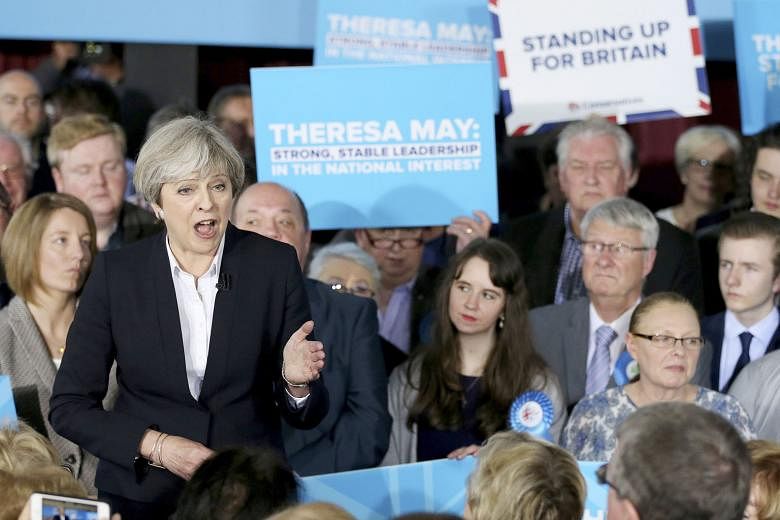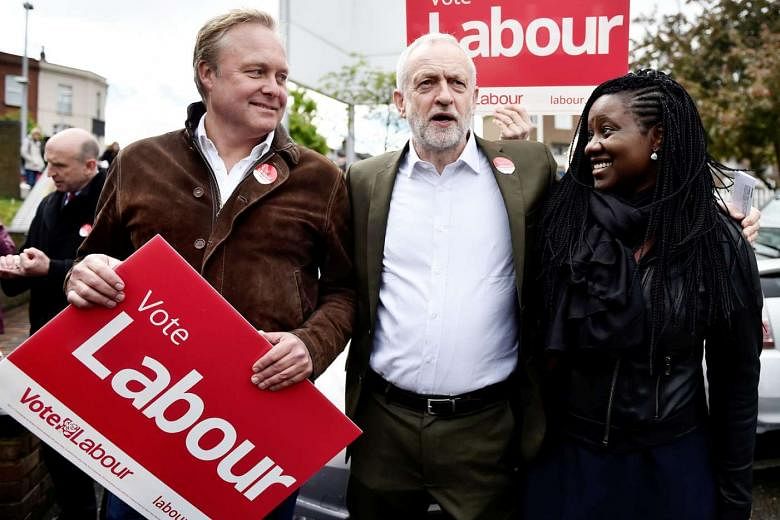LONDON • British Prime Minister Theresa May has embarked on the first week of formal campaigning for her country's general election with a seemingly unassailable advantage; the latest opinion polls give the governing Conservative Party a 19-point lead over the main opposition, Labour.
If translated into votes on June 8, election day, such a lead would grant Mrs May a crushing parliamentary majority and the decisive powers she seeks to negotiate Britain's departure from the European Union.
But all electoral surveys also indicate that support for Labour is rising. And despite meticulous planning, Mrs May's campaigning has been nowhere near as sure-footed as observers initially assumed.
She decided to call a general election a full three years before the end of her term, largely because she knew she can get a big majority. Labour, run by Mr Jeremy Corbyn, a far-left leader who languished for decades on the fringe of politics and remains deeply unpopular with the electorate, has almost no chance of gaining power.
The fact that Labour has also been wiped out in Scotland, where it used to control most of the region's 59 parliamentary constituencies, means that Mr Corbyn would need a massive swing before he has a chance of crossing the threshold of the Downing Street prime ministerial residence.
But enjoying a huge lead in an electoral campaign carries its own risks. It can breed apathy among voters and result in a low turnout, which can skew the final outcome. And it also means that, as far as media coverage of the election is concerned, the only narrative worth pursuing is that of a potential Labour revival, for otherwise the entire campaign remains boringly predictable.
Largely in order to forestall such dangers, Mrs May now includes in every speech a warning that "nothing can be taken for granted", and that if voters wish to retain her government, they need to go out and cast their ballots for her.
She also decided not to take part in any televised debate, shrewdly calculating that such events only help the opposition and that, although TV networks were bound to be furious, the matter would be largely forgotten come June 8.
Still, the race is tightening, with all opinion polls indicating that although Labour is heading for a decisive defeat, it no longer faces the rout it feared just a week ago.
That's not because Labour is campaigning well; Mr Corbyn is still ignored by the media, and his release this week of a "20-point plan for workers' rights" - which turned out to have only 18 points - attracted widespread derision.
Monday's decision by former Labour prime minister Tony Blair to "return to politics", unveiled on the same day Labour celebrated the 20th anniversary of its landmark electoral victory in May 1997, also hurt Mr Corbyn; while nobody knows what Mr Blair intends to do, he clearly wants to engineer Mr Corbyn's ouster immediately after the party loses the vote on June 8.
Nevertheless, the opposition is rallying. "Labour voters who were saying 'don't know' a week ago are now saying Labour," claims Mr Anthony Wells, research director for YouGov, an opinion pollster now predicting a diminished majority for the May government.
Mrs May also faces another danger: that of tactical voting, of electorates in marginal constituencies opting to vote for any party with a chance of defeating the Conservatives. The Liberal Democrats, Britain's smaller opposition party, are campaigning for precisely such a tactical vote among younger voters dissatisfied with Brexit; if the EU becomes a defining matter in these elections, the Conservatives' lead may be cut even further.
And although the British Prime Minister continues to enjoy many advantages, she remains an unexciting campaigner. Her facial gestures often come across as awkward grimaces, and she never strays from a few boilerplate phrases such as promises of a "strong government", or of "winning for Britain".
She is also accused of being too controlling; nobody has seen a draft of her party's manifesto, which is being kept as a closely guarded secret until its release next week. Running a disciplined campaign is clearly an asset, but it also carries the danger of transforming the election into a referendum about Mrs May.
Yet, paradoxically, Mrs May's biggest danger is that of managing expectations. She is expected to win with at least a 100-seat overall parliamentary majority, and anything less than that would be considered a defeat.



